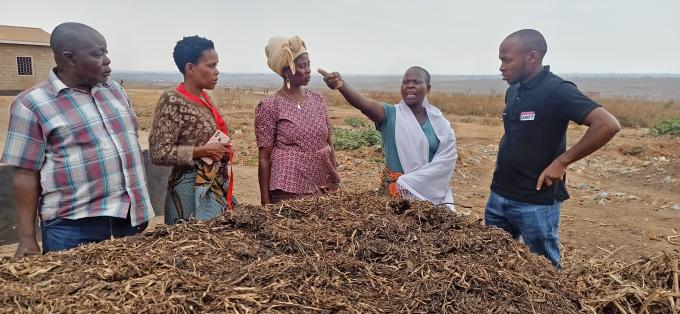Turning Trash into Treasure
Chinsapo Market, nestled in the heart of Malawi's bustling capital, Lilongwe, has long been a vibrant hub of commerce, drawing vendors from nearby trading centers to trade their agricultural bounty.
Yet, beneath its lively surface, a looming issue threatened the health and livelihoods of its inhabitants - unmanaged waste. However, today, Chinsapo Market has undergone a remarkable transformation, with waste now carefully gathered, collected, and recycled.
This remarkable change owes its success to the Shift Project, a youth-driven initiative supported by Save the Children and linked to the National Youth Network on Climate Change (NYNCC). Comprising 16 young individuals aged 18 to 25, this campaign is targeting Chinsapo Market, which serves a population of approximately 260,000 people. Through the involvement of influential figures from the market and surrounding community, artistic expression, and a deep commitment to environmental change, the Shift Project is rewriting the narrative of waste management in Chinsapo.
Nestled in the eastern reaches of Lilongwe, the capital of Malawi, Chinsapo Market stands as a vibrant testament to the hustle and bustle of daily life in this bustling city. With vendors converging from nearby trading centers to showcase their agricultural bounty, the market has always been a central hub for commerce. Yet, beneath the colorful displays of produce and the cacophony of traders, a growing problem festered, threatening the very heart of Chinsapo.
The issue at hand was none other than uncontrolled waste. The market's success had inadvertently spawned a refuse problem that not only jeopardized the well-being of its inhabitants but also cast a shadow over their livelihoods. However, if you were to visit Chinsapo Market today, you'd witness a remarkable transformation. Gone are the days of haphazardly scattered garbage; in its place, a well-organized system for waste collection and recycling.
This extraordinary turnaround is the handiwork of the Shift Project, an initiative fueled by youthful vigor, funded by Save the Children, and associated with the National Youth Network on Climate Change (NYNCC). Comprising 16 members, aged between 18 and 25, this group of dynamic individuals has set its sights on Chinsapo Market, a bustling locale that supports an estimated population of 260,000 people.
But what sets the Shift Project apart isn't just its determination; it's the way it leverages influence throughout the market and the surrounding community. From informal market influencers to minibus call boys, traditional leaders to musicians, the campaign deploys a captivating arsenal of artistic expressions, including poetry, drama, and music, to amplify its message of change.
Uppeh Asedi, one of the driving forces behind the Shift Project, explains the group's mission with passion: "We wanted to address a pressing environmental issue, which is why we chose waste management. Observing Lilongwe's inadequate waste management infrastructure, we selected Chinsapo Market as our model site."
The Shift Project, in collaboration with market committees and various community structures, engaged in a series of meetings with local district and city councils to share their vision.
Asedi acknowledges the challenges faced during this process, including a prevailing mindset that considered waste management solely the responsibility of government authorities, compounded by a shortage of cleaning equipment. However, their persistence paid off, as they emphasized the shared responsibility for waste management and provided essential tools to clean up the market.
Paipi Black, Chairman of Chinsapo Market, applauds the Shifters for their role in shifting mindsets regarding refuse management: "They provided us with chlorine, gumboots, bins, sanitizers, and other essential equipment, enabling us to manage market waste effectively. With this equipment, there are no excuses for a dirty market."
In fact, the market can now maintain cleanliness efficiently, sweeping refuse to a designated dump site where a group of dedicated women work their magic, transforming garbage into valuable manure.
Agness Mchecheta, a member of the remarkable group of 50 women responsible for collecting and converting garbage into manure, shares her perspective: "We arrive at the market daily with our wheelbarrows and bins, sorting plastics separately from agricultural refuse. Cabbage and potato refuse even fuel our gas production, while the rest becomes valuable manure."
This newfound resourcefulness has brought about a significant transformation in their lives. Mchecheta proudly proclaims, "We've discovered wealth in the things people discarded."
Eunice Kayaka, the sanitation secretary for Chinsapo 1 Ward, underscores the project's broader impact: "Thanks to the training we received from the Shifters, we now educate our community on responsible waste management practices. Today, Chinsapo radiates cleanliness, unlike the past."
The praise doesn't stop there. Group Village Headwoman Chinsapo recognizes the double-edged success of the Shift Project, turning the market into a clean, efficient trading hub while converting refuse into manure. She envisions a brighter future for Chinsapo, shaped by this unique initiative.
With a commitment to expanding their reach, the Chief pledges to replicate the project in smaller markets throughout the area. Lilongwe City Mayor Richard Banda is equally enthusiastic, emphasizing the project's broad benefits: "Everyone benefits because it's a value-driven process. The Shifters in Lilongwe have achieved a great deal, and now, it's time to extend their transformative efforts to other areas, benefiting even more residents."
In a world that often overlooks the importance of sustainable waste management, Chinsapo Market's transformation is a testament to what can be achieved when passionate young minds come together to turn trash into treasure. The Shift Project has not only revitalized this bustling market but also set a powerful example for communities far and wide. In Chinsapo, waste is no longer a problem; it's an opportunity for growth and transformation.

 Malawi
Malawi